- Home
- Janelle Taylor
Destiny Mine Page 2
Destiny Mine Read online
Page 2
Martay watched the lovely face of her precious child vanish beneath the paints Kionee must wear at all times, except during certain rituals which would be performed after her sixteenth summer when she would use a buckskin mask with a full border of flowing black and white feathers, special markings, and breast-length tassels with beads and tiny plumes. She stared at the clay jar which held captive her daughter’s female spirit, one which would be placed in the tiva lodge with her own sister’s and the other tivas’. Martay’s eyes returned to the vivid mask on her beloved child’s face; then her gaze roved those of the other tivas, including Regim’s. She knew the reasons for the masking custom: to prevent men from thinking of a tiva as a woman during the hunts or battles or council meetings and from gazing upon one with desire. It caused other women to forget or ignore a tiva was a female, and give them proper respect. It also prevented men of other tribes from guessing the truth and attempting to steal and enslave tivas. Until a girl was old enough to reapply her face paint after bathing, other tivas were required to do so, using her hand tattoo for pattern guidance. Martay wanted to snatch the talking-feather from her belt and shake it for permission to speak to men in public. She wanted to tell them this practice of making girls into half-boys was wrong and cruel. Yet, she knew she felt this contradictory way only because Kionee was now included.
How can a female forget she is a woman when she has breasts and a lovely face to hide and is confined in the Haukau between the full moons when blood flows from her lower region? Martay fretted. She knew the alleged reasons why tivas could not have mates and children. But if a girl must be a Hunter-Guardian, she should be equal with Hunter-Protectors in all ways!
Martay rebuked herself for being selfish and angry, but she could not halt those emotions at this difficult time. If she had not been spared that rank by being born the second child in a family of only daughters, she would be a “man” this moon; she would not share a tipi and mat with Strong Rock. To never experience love, kisses, embraces, and children seemed a great sacrifice for only tivas to make. But the child of Strong Rock must not be the first chosen one to dishonor her family and people by refusing her rank or by fulfilling it badly. Martay realized she must pray and make offerings to Atah to give herself the strength and courage to do what she must, and to forgive her for wicked feelings and thoughts.
Spotted Owl motioned for the group of over forty tivas to come forward. He waited and listened as they promised to do their best to train the girls for their future duties and to teach them to be obedient to their fates. Afterward, the group returned to its assigned place.
Concealed behind rocks, the chiefs eight-year-old son and the boy’s best friend spied on the ritual with keen interest and amazement. They knew tivas of all ages but had not known they were girls and women until this moment. As they whispered back and forth, they guessed the secret was kept from children to prevent exposing it to outsiders who came into contact with the Hanueva. They talked of how other tribes would laugh at them for having female hunters and warriors, so they would never reveal the offensive truth. The secret explained to them why tivas did not swim and bathe with boys or men, and always kept their real images hidden. Wide-eyed and alert, they watched Kionee’s pretty face disappear behind one of those painted designs. They heard her declared to be a boy now! She would play, hunt, and train with them when the new sun rose! At times, they had been jealous of the “boys” and “men” with colorful faces who were said to be sacred “chosen ones.” Both boys sneered they no longer wanted to be tivas, and swore never to allow a girl to become a better hunter or fiercer warrior! When the climactic dancing, singing, and drumming began, the youths sneaked back to camp.
After the dreaded ritual ended and her child approached, Martay gazed into the upturned and colorful visage of her “son.” A bitter fate had been forced upon them: from this moon until Kionee’s death, she would wear the Mask-of-the-Hunter and live only for the survival of others. To hide her inner turmoil, Martay forced out a smile, which the “boy” returned with love and respect.
In a gentle but firm tone, Martay said, “You must go with Regim, Kionee; you will stay in the tivi tipi with the elders for a learning season. After you are trained and skilled, you will return home to us. This is a big task, little one, and you must do your best in it. Obey the tivas’ words as you obey mine and your father’s. Sumba will be with you in training.”
Kionee smiled innocently and nodded before hugging Martay. She accepted her aunt’s large hand and departed.
Martay’s burdened heart cried out, Good-bye, my little daughter; may you never experience the kind of searing pain which burns in me this moon.
1
March 1813
Wind River Canyon
THE SCENE BEFORE HER of three sisters working on a cradleboard for the first child of one of them became too much for Kionee to endure. As the women stitched and beaded, they made guesses about the baby’s sex and destiny. Becoming a mother was one of life’s glorious moments for a female, a great happiness and victory Kionee was denied in her tiva rank.
Young men were playing their flutes, giving doubleback rides, and taking long walks with girls. Soon snow would be gone; grasslands and trees would be green; flowers would bloom. Mother Earth and Nature would renew themselves and reproduce. Perhaps, Kionee reasoned, that was the cause of her discontent, envy, and tension during this changing season: female urges and instincts buried deep within her were straining to burst forth when she must hold them captive. It also was near the time for her blood flow, another reminder she was female, a reminder she was different and set apart from her true sex. She hated those few suns she was confined to the Haukau and often prayed they would cease since they had no purpose. The cold season had been too long and harsh and given her too much thinking time. Suns spent at weapon-making and repairs while trapped inside by snow and strong winds had kept her hands busy but left her mind free to escape and roam forbidden territory.
Though her feelings were in a turmoil, Kionee was too well trained in deceit and self-control to let it show. Yet Kionee felt as if the emotions might boil over at any moment, burning her and those around her. She realized she could no longer witness the tormenting scene and stay reserved, and she must not risk losing her pride and honor.
Kionee drew a quiet breath in resignation of her fate as the hunter and guardian of her family, as the son her parents could not have. “I wait no longer for Sumba. I will speak with your brother on the new sun.”
Before the tiva’s sisters could use their talking-feathers for permission to speak to a “man,” Kionee ducked and departed. In an agitated state, she decided not to search for Sumba, who had taken the tiva vows with her at sixteen. Though Sumba remained her best friend behind Regim and Maja and had shared her existence in the elders’ tipi for eleven circles of the seasons, Kionee had not exposed her inner conflict to her “brother” who was happy in “his” rank. Their winter camp was spread along the river for a great distance in the sheltering canyon, and Sumba could be inside any of the 258 tipis where over a thousand Hanueva lived. Kionee also needed to be alone to regain her poise and to clear her head.
“We go, Maja,” she told the silver wolf who joined her the instant she was in sight. Ever since she’d rescued him from certain death ten years before, the powerful and loving animal had been her constant companion and loyal friend, the only one at this point in time to whom she could spill her heart. On the way to her family’s tipi, Maja’s head grazed Kionee’s fingertips in affection and in comfort, as if he perceived her distress. In response, she glanced down, smiled, spoke to him, and ruffled the thick fur on his neck. “We are a pair for life, Maja, for we do not belong to our packs or have mates.”
In the distance, Kionee saw her father entering a friend’s tipi for a visit. He struggled with the crutches that enabled him to get around on one leg, as the other had dangled useless from his body after an enraged buffalo bull rammed his horse and trampled it two summers past. That
was when she assumed the rank of sole provider and protector of her family. She was the youngest tiva with that responsibility, as most took control when their parents were older. She was aware of how much her family needed and depended upon her for survival. She could guess her family’s fate if anything terrible happened to her. For certain, she could never break her vow and leave them helpless, shame them and herself.
Kionee entered Strong Rock’s dwelling and told her mother she was going to hunt fresh game and to scout the departure of winter.
“That is good, my son. Watch the sky for danger,” Martay cautioned, her eyes aglow and her heart warmed by her child’s accomplishments.
“I need another deerskin, Brother, if you find one.”
“The hide I bring home will be yours, Sister,” Kionee replied to her oldest sibling, Blue Bird. “I will return before the moon comes.”
Kionee retrieved the bow and quiver of arrows from a wooden tripod which held her many weapons, her tipi-of-power. She took a large bundle outside to untie and unwrap it in fresh air, as a clever hunter never allowed cooking or heating odors, smells which would warn animals or enemies of his approach and presence, to penetrate his robe. Nor did she use grease on her hair and skin to help retain body heat. At the trees where she kept her horses secured and tended, she tossed a white throw over the pinto to hide his brown markings and put a braided bridle around his jaw. She settled the albino fur cloak over her dark hair and buckskin-clad body to keep her warm and to conceal her from prey and predators’ view. With Maja loping beside her, Kionee left the tranquil encampment.
Most of the ground was covered by a blanket of snow, but eager green shoots made their presence known here and there. Kionee passed the hot springs area where water refused to freeze even in the harshest weather. Nestled close to it, she saw plants with furry white heads which scattered like tiny feathers in a stiff breeze or if one blew rapidly on them. Pasqueflowers had pushed their stems through the frigid barrier and put forth blooms. Yellowbell had done the same, and it offered roots to be eaten raw or cooked. The white garments that trees and bushes had worn for so long were being discarded a layer at a time. The strong, bone-chilling winds had calmed for a while, and ice was deserting the ponds, rivers’ edges, and streams’ banks. Game was moving easily and more frequently through the forests, hills, and grasslands. In almost two full-moon cycles, Kionee recalled, her people would break winter camp to travel to the plains to hunt buffalo. Surely that would distract her from current worries. It must, as she would need all of her wits about her when racing with a huge and powerful herd of great beasts.
The tiva inhaled crisp, clean, cold air and enjoyed the gentle breeze wafting over her. She looked at the clouds in the pale-blue sky. More snow was coming soon. Perhaps it was Nature’s final attempt to hold off the warm season.
The huntress approached a peaceful forest where green pines and fir mingled with naked branched aspen, ash, and cottonwood. Kionee knew from experience that game might be located feeding on tender new grass along riverbanks or nibbling tasty bark in aspen thickets. She glanced at the rocky cliffs of red, reddish brown, and gray which rose above the timber. Snowdrifts bordered the meadows and heaps of white filled crevices in the broken range on either side of her. She silently guided her mount into the densest section of the forest, as most animals preferred cover to open terrain. She liked the wild and often fierce beauty of this setting; and she liked being alone with her wolf and horse for companions.
As the sun glittered off snow and ice, Kionee squinted her large brown eyes to thoroughly scan her surroundings. She knew animals often became almost invisible in tangly underbrush. She saw a mule deer bolt and flee, and knew it was useless to pursue it. A coyote darted into hiding not too far ahead of her. His pelt was as bold and noticeable against a stark white backdrop as were those of dark opossums who traveled snow-topped limbs above her in sluggish caution.
Then Kionee found the tracks she wanted: elk, a big one, moving at an unhurried pace. She must trail him deeper into the forest. The skilled huntress focused on each tree before her, the limbs in particular, as antlers and horns were often mistaken for them and ignored.
Kionee dismounted to check a spot where snow was melted; it told her the animal had urinated recently and was not far ahead. The wind was in her favor, but it did not bring her the scent of her prey. She listened for hooves crunching in the snow or for antlers scraping against a tree, but there were none. She proceeded with caution until it was time to dismount and continue on foot. She ordered Maja to remain with and guard Tuka so the elk would not catch their smell, panic, and escape. Accustomed to living and working together for years, the wolf and horse obeyed without hesitation, unafraid of each other.
Kionee closed the distance between her and her quarry. Trees and a snowbank concealed her advance. She heard the animal snorting. She slipped behind bushes, still laden with snow in the shade, and hid her painted face behind a white deerskin mask. Kionee peeked from the hiding place and saw the creature pause to check its security. She eased two arrows from a quiver; one she stuck in the snow for swift and easy retrieval, and the other she nocked on her string. She made certain any movements were silent and slow.
Kionee counted the points on his rack: eleven, reaching high over his head. His large neck was covered in thick fur. His long legs were poised in readiness. She took a steadying breath, aimed, and fired. Her weapon swooshed through the still air and the tip thudded as it struck its target. Her arrow seemed to cast a mysterious shadow as she heard the shot echo through the forest. There was no need to fire again because, as the elk bellowed and twisted, she heard its legbone snap. While the animal snorted and thrashed in death’s throes, she saw the reason for the echo: a second feather-tipped shaft protruded from the beast’s chest on the opposite side. She seized and nocked the second arrow, then took a stance of self-defense and balance as she inspected the dense timberline across from her position.
Kionee saw a man watching her, surprise revealed for a moment in his expression. She heard the elk buckle to the ground, but kept her gaze locked on the intruder who had quickly mimicked her same precautions.
For several minutes, the two hunters stared at each other and waited to see what the stranger’s next move would be. Neither had expected to encounter someone else, and both were amazed by their rival’s prowess. Neither could determine if the other was a threat who would battle for possession of the mutual kill.
Kionee studied the man whose tall body was cloaked in a calf-length buffalo robe. Golden-brown hair—lighter than she had seen on any Indian—flowed over his broad shoulders; two thin braids framed an unscarred face that caused the breath to catch in her throat and her heart to beat oddly. Though his more than appealing face was unmarked with painted symbols and no coup feathers were in his hair, she surmised by his hunting skill that he was a well-trained and successful warrior. His expression was one of confidence; no fear was visible in his tawny gaze. She was—and yet was not—astonished when he lowered his bow until its arrow pointed to the ground.
Instead of putting aside his weapon to make intertribal hand signs, he asked, “Ne-tsehese-nestse-he?”
Kionee slightly lowered her bow but stayed alert as she said, “Na-tseskee-tsehese-nestse,”—“Cheyenne a little.” “Na Hanueva,” she revealed her tribe. With her gaze locked on him and using one hand, she untied and removed the white deerskin mask and dropped it to the snow. His people were friendly to hers, if he was in truth Cheyenne as his use of their language implied. She watched his gaze study her facial mask, then saw him nod acceptance of her identity. She eyed him as he replaced the arrow in its quiver and headed for the slain elk.
Kionee did the same. When they met at the fallen beast, he looked at her again with great interest. The color of his eyes matched that of Maja’s. He was a head taller than her, and his body much larger. He appeared to be a few winters past her twenty.
Using his language along with intertribal signs and words, the
y communicated with each other.
“Na-tsesevehe E-neha He-nehe. Ne-toneseva-he?”
She listened as he told her his name and asked hers. Lowering her voice as trained to disguise her sex, she replied, “Kionee.”
“Tiva-he?”
She nodded she was a tiva, as her mask implied. “Son of Strong Rock and Martay of the Hanueva. I am the Hunter-Guardian for my family. Why does Stalking Wolf of the Cheyenne come so far to our forest to hunt?”
“We go to the sacred Medicine Wheel to seek a vision and to offer gifts to the Great Spirit. While Mother Earth still wears her white blanket, this path is best to ride. We need fresh meat. I will take a small share and you will take the large one for your family. Is that good?”
Kionee was impressed by his generosity and kindness. “It is good, since both arrows were true and matched in flight. Who travels with you? Where is your tipi?”
“Two friends. They wait in camp that way.”
Kionee’s gaze followed the line of his pointing finger. “Bird People camp in the land where the earth bubbles as kettles and spews water into the air. They ride to the sacred wheel many times; they do not remain in camp when the ground is good. Crow and Cheyenne are enemies. They are many and you are three. If their eyes find you, they will attack.”
“The son of Big Hump fears no Crow, but we do not seek a fight this moon. We use the land and our skills to hide our coming and going.”
“You are the son of the Strong Heart chief?”

 Shadowing Ivy
Shadowing Ivy Chase The Wind
Chase The Wind By Candlelight
By Candlelight Kiss of The Christmas Wind
Kiss of The Christmas Wind Stardust And Shadows
Stardust And Shadows Forever Ecstasy
Forever Ecstasy Destiny's Temprtress
Destiny's Temprtress Haunting Olivia
Haunting Olivia Wild Is My Love
Wild Is My Love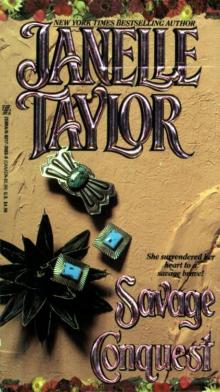 Savage Conquest
Savage Conquest Valley of Fire
Valley of Fire A Christmas Surprise
A Christmas Surprise Midnight Secrets
Midnight Secrets Dying To Marry
Dying To Marry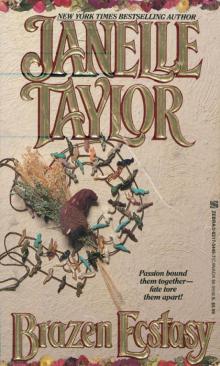 Brazen Ecstasy
Brazen Ecstasy Someday Soon
Someday Soon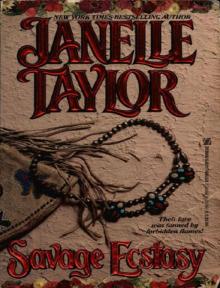 Savage Ecstasy
Savage Ecstasy Can't Stop Loving You
Can't Stop Loving You Golden Torment
Golden Torment Forbidden Ecstasy
Forbidden Ecstasy Fortune's Flames
Fortune's Flames First Love Wild Love
First Love Wild Love Follow The Wind
Follow The Wind Promise Me Forever
Promise Me Forever Love Me With Fury
Love Me With Fury In Too Deep
In Too Deep Lakota Winds (Zebra Historical Romance)
Lakota Winds (Zebra Historical Romance) Anything For Love
Anything For Love Cherokee Storm
Cherokee Storm Straight From The Heart
Straight From The Heart Don't Go Home
Don't Go Home Wild Winds
Wild Winds Tender Ecstasy
Tender Ecstasy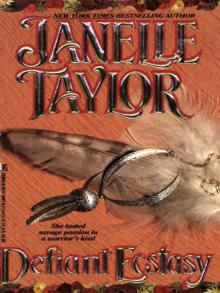 Defiant Ecstasy
Defiant Ecstasy Defiant Hearts
Defiant Hearts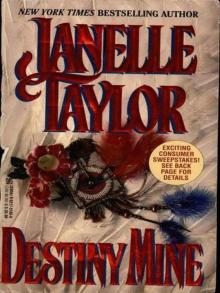 Destiny Mine
Destiny Mine Lakota Flower
Lakota Flower Passions Wild And Free
Passions Wild And Free Sweet Savage Heart
Sweet Savage Heart Stolen Ecstasy
Stolen Ecstasy Necessary Evil
Necessary Evil Lakota Dawn
Lakota Dawn